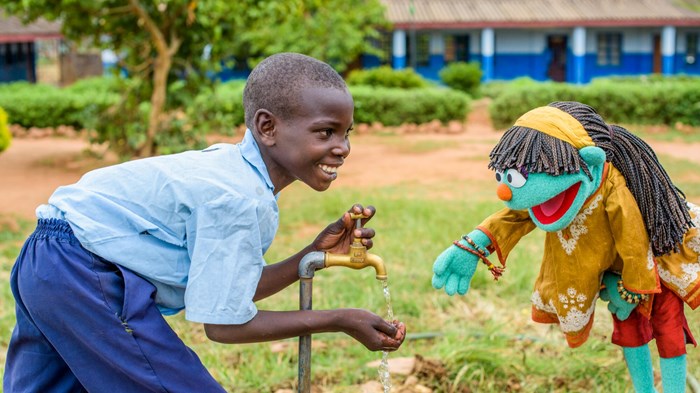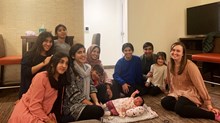How ATMs and Sesame Street Are Helping with Clean Water and Sanitation Around the World

Dr. Greg Allgood is the Vice President for Water at World Vision (WV). His role is to develop and implement strategies for efforts relating to water, sanitation, and hygiene (WASH), establish partnerships and work with WV affiliates in 41 countries to complete its strategic plan for WASH. Prior to joining WV in 2013, Dr. Allgood was spent 27 years at Procter & Gamble. He holds an MS in Public Health and a Ph.D. in Toxicology.
Below is an edited version of an interview with Dr. Allgood conducted in September 2021 by candidates for a Masters’ degree in Humanitarian & Disaster Leadership (HDL) offered by the Humanitarian and Disaster Institute (HDI) at Wheaton College.
HDI: How does your work in WASH fit into the broader transformative development mission of World Vision?
Allgood: Our goal at World Vision is to show the love of Christ by loving the poor and one of the best ways to love the poor is to help them sustainably lift themselves out of poverty. So, we come alongside communities and co-create solutions that will last. And the way we pick where we work is we want to work in the most fragile contexts. Whether it's Afghanistan or South Sudan or the Tigray region of Ethiopia or Haiti that's, that's where we serve. We usually pick an area, then we commit to being there for the long-term, typically 10 to 12 years, and we put people on the ground. So, the local staff live and work in these communities to establish trust. If we were only a water NGO, there's no way we could afford to do that. To literally have staff living and working in the community for that long would be impossible. It's possible for us because we're not only the largest nongovernmental provider of clean water on the planet, we're also the largest child sponsorship organization.
HDI: Tell us about the partnerships WV has established with academic institutions and how research has guided your strategy.
Allgood: World Vision's programs in Ghana were independently evaluated by the Water Institute (at the University of North Carolina), and that work showed that World Vision wells were more sustainable because of the community development approach that we use and having the water management committees. (Water management committees are made up of local residents to oversee maintenance after WV installs a well.) A six-year partnership (with UNC) led to two of the largest evaluations ever conducted of WASH programs. The most recent was a 14 Country Evaluation with 30,000 household surveys, just a massive database, that the World Health Organization (WHO) and UNICEF are using for advocacy on things like WASH and health care facilities.
We're going to really look at our work in WASH and health care facilities, for which we’ve become a global leader, as far as the number of health care facilities we reach. And so, we want to work at how do we make sure that that work is sustained, and what's the most bang for the buck? We know that a healthcare facility without good water, sanitation, and hygiene will be a cause of infections -- moms and babies will get infections when they go there. What are the things that are going to be the best for reducing healthcare-acquired infections? Those are the main thrusts of our partnership.
HDI: Tell us about your long-term plans for WASH and your progress to date.
Allgood: We reached this point where we really wanted to grow and one of our donors, Dave & Dana Dornsife said, “What if we gave you a really big grant? What more could you do?” And so, we pulled together our first five-year business plan. We said we're going to commit to those countries over five years, and Dave and Dana give us $35 million and required a match of the same amount from others, and it actually led to much, much more match than that…and so that's when we began to scale up. Then we had our second five-year business plan, and they gave us $40 million. Then we just launched our third round of five years, and that business plan was kicked off by a $40 million additional grant from David & Dana Dornsife and it has allowed us to be the clear global leader, reaching a new person every 10 seconds. We made huge commitments for how we're going to reach everybody everywhere we work with clean water by 2030, which is about 50 million people.
This is one of the best investments you can make if you want to really change the world, to provide clean water, and to do it in such a sustainable and cost-effective way as we're doing it.
HDI: How do you see WASH affecting other areas of development? In other words, what are the ripple effects of clean water?
Allgood: Water does change everything, so with no water then kids are sick, women are … really their life is filled with the drudgery of hauling water every day. Half of the amount of malnutrition in the world is caused by diarrhea from unsafe water, poor sanitation, and hygiene. You don't get an education because you're hauling water, you don't get economic opportunities because your hauling water, and you can’t go to church because your hauling water. So, it really does start with water, and it enables all those other areas that World Vision also works in like microfinance and economic empowerment and, Christian witness and it enables all those other things to really gain a foothold and, and at the end of the day sustainably lift people out of poverty which is our goal.
HDI: How has your approach to WASH changed over time?
Allgood: What has changed is that build sizes have gotten larger and also the technology to provide the water has improved. What used to be more than 90% of what we did (a borehole with a hand pump) … going forwards, it's 3%. So, what are we doing? We still do a lot of hand pumps … but now we're much better at doing what's best for that situation … the hydrology, the local community, the energy sources, the population. Many times now it is still a borehole, but instead of a hand pump because the village is bigger, you put in a submersible pump, you power it with solar panels, you pull the water up into an overhead storage tank, and then it can flow by gravity throughout the community, so it was not one collection point that everybody is lining up around, but it's directly into the schools, its directly in the health care facilities, and multiple collection points and now more, even in people's homes with a loan from us to self-fund.
Sustainability has been improved by things like instead of having a person who collects fees at the hand pump, now there is an automated kiosk. We’ve worked with Grundfos, the largest manufacturer of submersible pumps, and they developed something called AQtap water ATM. It's sort of like a gas station you have a water credit card that you load money onto with your mobile phone and it shows how much money you have, and you pump water. That's more sustainable because it's 24-hour service and it does a better job with collecting fees. We found that fee collection has gone up so much, in these areas we have these automated kiosks, that we’re able to lower the rate because we're collecting so much more money.
HDI: What are some other innovations in the way you implement WASH?
Allgood: The solar panels on those systems just last and last and last, but when they break down, they are a lot more difficult to fix than a handpump. So, when it does it costs a lot more. Well, that's why you have insurance. We've worked in Kenya and Zambia with insurance companies and the volumes there say it is a profitable business. Things are breaking down, the insurance companies are paying, and so we're bringing insurance to these decentralized water systems.
The future of WASH, we believe, is people want water in their homes and to flush toilets. We've measured that with Stanford University, the difference between having water in the home versus having water nearby within a 30-minute round trip is, is pretty big. People's gardens increased by a third, which means better nutrition and more income because they have more to sell. The time savings is very significant. Even a 30-minute round-trip, if you have to do that three times a day when you could be studying as a girl, is pretty huge for you. You know there's a problem with (water) recontamination during carrying, but if you have it in your home that's, that's not an issue. So, our water systems now are designed to allow for those household connections, but we don't typically fund the household water connection. That's something we want them to get a loan through Vision Fund to achieve. We've done it in Ethiopia, we've seen that is pretty successful, where we are doing it now and in Kenya and plans for Ghana.
UNC, they really looked at you know, why do some of these systems last for 20 plus years? And it goes back to women on the water committees. They're the ones who are going to be impacted if they lose access to clean water, so we're now encouraging and counting the number of women on water committees, but I think we can go further than that, and really show how, and measure how, so we will get better at achieving it, we measure how we're creating really transformative work in the community by the spark of water leading to better social networks, better economic empowerment, more businesses for women.
HDI: We understand you have also been teaching hygiene to children with Sesame Street characters.
Allgood: It starts with getting children sponsored and seeing that extra love and attention they get because they have child sponsors and their whole community is lifted up. The Sesame Street Program that we've now had started in Zambia, it’s in 14 countries, its reached hundreds of thousands of children and it's using the Muppets, a specific Muppet called Raya, but also Elmo, to engage children with healthy behaviors particularly addressing those things that we hadn't been doing as good a job of, hand washing and building the family, using a latrine. So that program is called WASH-Up, and it far exceeded our expectations in terms of the number of kids reached because the Zambian government loved it and wanted us to expand it. Teachers loved it. We have a measurement partner Stanford (WASH-Up Fact Sheet) that's helping us get better and better. One of the reasons that the program works so well is kids learn through play and if it's something they love they, learn it better.
Greg Allgood is VP of Water for WorldVision. He also founded and spent 26 years directing the Procter & Gamble Children’s Safe Drinking Water program, during which time he worked with the Clinton Global Initiative, Gates Foundation, UNICEF, WHO & USAID.
The Better Samaritan is a part of CT's
Blog Forum. Support the work of CT.
Subscribe and get one year free.
The views of the blogger do not necessarily reflect those of Christianity Today.






















